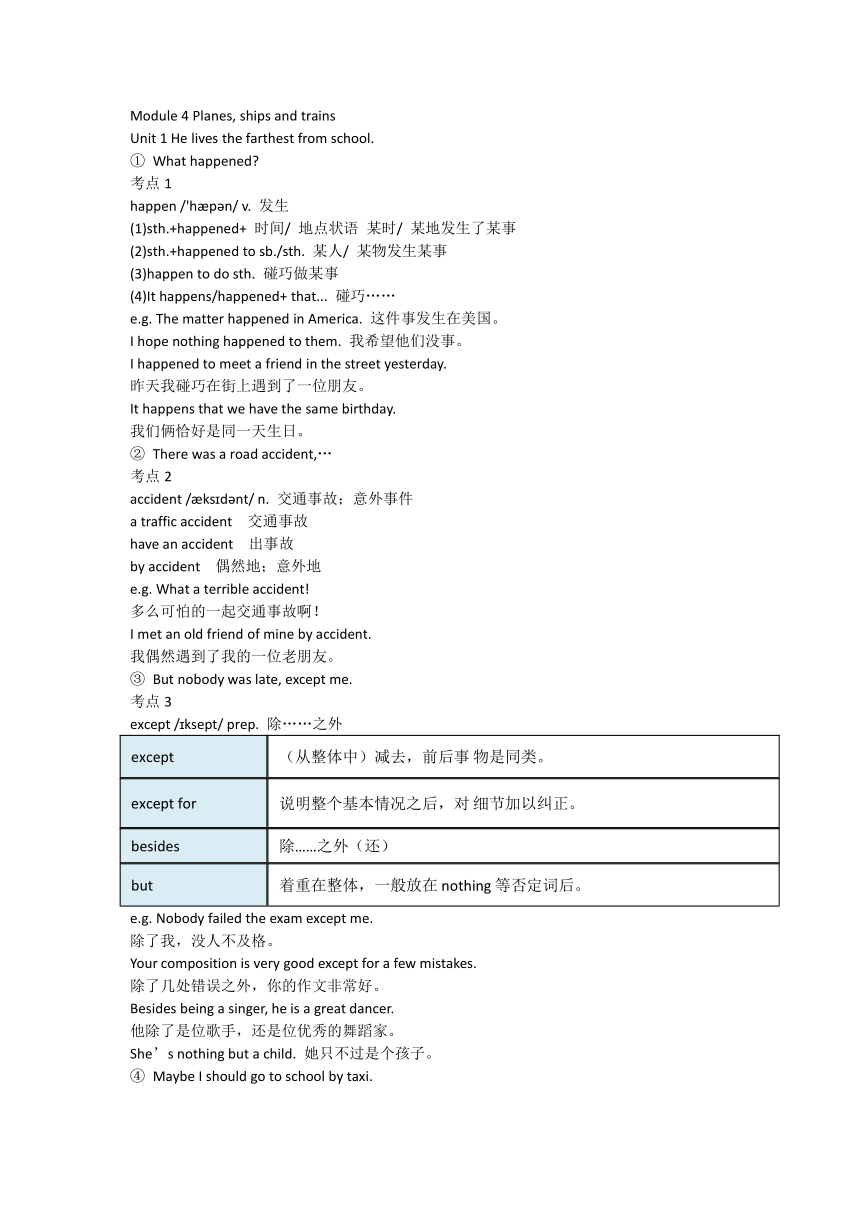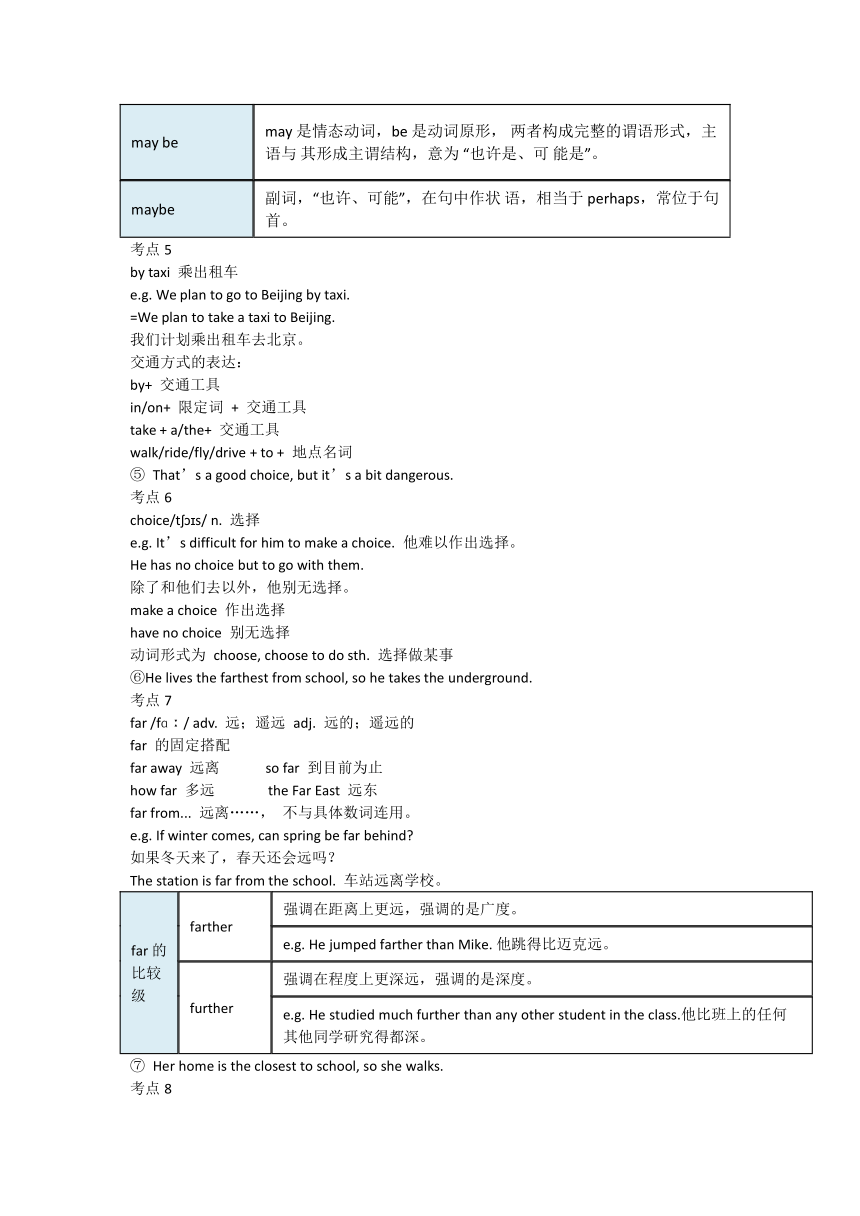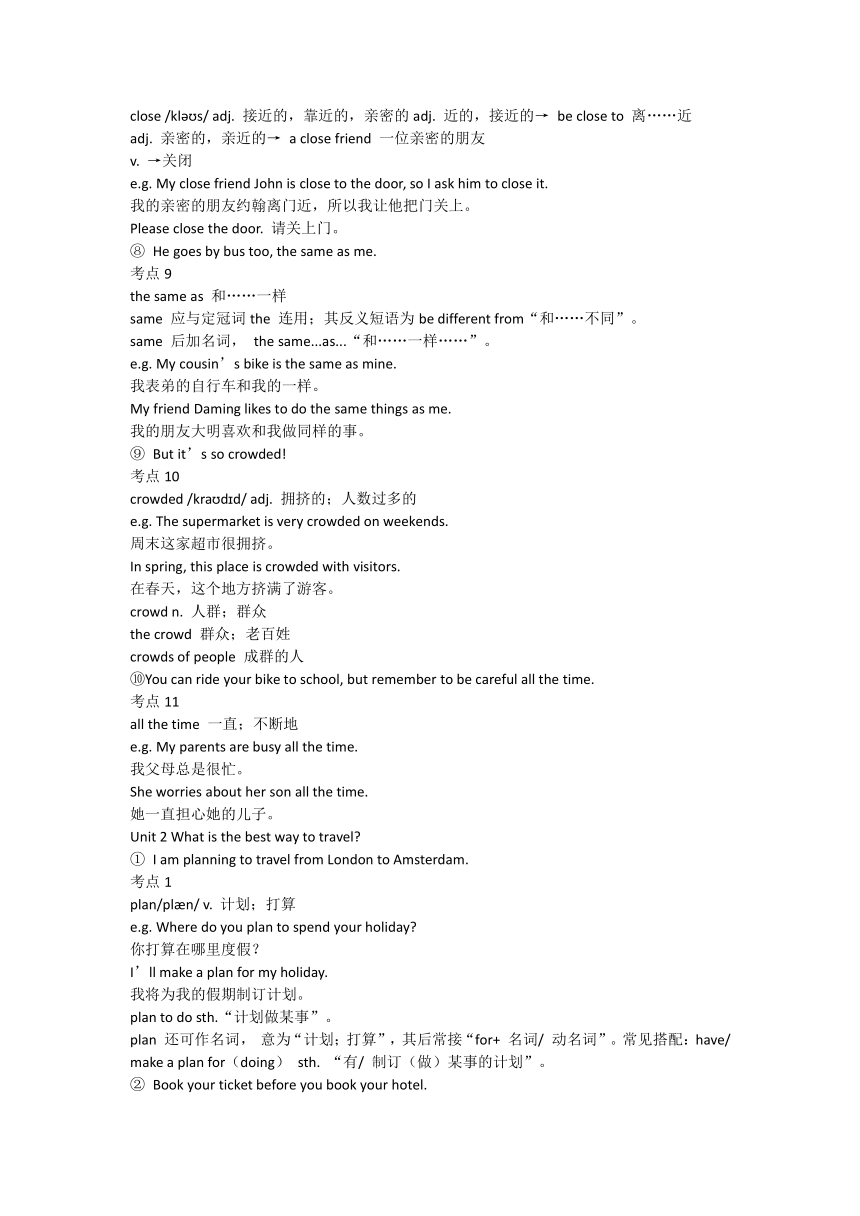Module 4 Planes, ships and trains 知识点讲义
文档属性
| 名称 | Module 4 Planes, ships and trains 知识点讲义 |  | |
| 格式 | docx | ||
| 文件大小 | 24.8KB | ||
| 资源类型 | 教案 | ||
| 版本资源 | 外研版 | ||
| 科目 | 英语 | ||
| 更新时间 | 2023-09-09 07:07:18 | ||
图片预览



文档简介
Module 4 Planes, ships and trains
Unit 1 He lives the farthest from school.
① What happened
考点1
happen /'h p n/ v. 发生
(1)sth.+happened+ 时间/ 地点状语 某时/ 某地发生了某事
(2)sth.+happened to sb./sth. 某人/ 某物发生某事
(3)happen to do sth. 碰巧做某事
(4)It happens/happened+ that... 碰巧……
e.g. The matter happened in America. 这件事发生在美国。
I hope nothing happened to them. 我希望他们没事。
I happened to meet a friend in the street yesterday.
昨天我碰巧在街上遇到了一位朋友。
It happens that we have the same birthday.
我们俩恰好是同一天生日。
② There was a road accident,…
考点2
accident / ks d nt/ n. 交通事故;意外事件
a traffic accident 交通事故
have an accident 出事故
by accident 偶然地;意外地
e.g. What a terrible accident!
多么可怕的一起交通事故啊!
I met an old friend of mine by accident.
我偶然遇到了我的一位老朋友。
③ But nobody was late, except me.
考点3
except / ksept/ prep. 除……之外
except (从整体中)减去,前后事 物是同类。
except for 说明整个基本情况之后,对 细节加以纠正。
besides 除……之外(还)
but 着重在整体,一般放在 nothing 等否定词后。
e.g. Nobody failed the exam except me.
除了我,没人不及格。
Your composition is very good except for a few mistakes.
除了几处错误之外,你的作文非常好。
Besides being a singer, he is a great dancer.
他除了是位歌手,还是位优秀的舞蹈家。
She’s nothing but a child. 她只不过是个孩子。
④ Maybe I should go to school by taxi.
may be may 是情态动词,be 是动词原形, 两者构成完整的谓语形式,主语与 其形成主谓结构,意为 “也许是、可 能是”。
maybe 副词,“也许、可能”,在句中作状 语,相当于 perhaps,常位于句首。
考点5
by taxi 乘出租车
e.g. We plan to go to Beijing by taxi.
=We plan to take a taxi to Beijing.
我们计划乘出租车去北京。
交通方式的表达:
by+ 交通工具
in/on+ 限定词 + 交通工具
take + a/the+ 交通工具
walk/ride/fly/drive + to + 地点名词
⑤ That’s a good choice, but it’s a bit dangerous.
考点6
choice/t s/ n. 选择
e.g. It’s difficult for him to make a choice. 他难以作出选择。
He has no choice but to go with them.
除了和他们去以外,他别无选择。
make a choice 作出选择
have no choice 别无选择
动词形式为 choose, choose to do sth. 选择做某事
⑥He lives the farthest from school, so he takes the underground.
考点7
far /fɑ / adv. 远;遥远 adj. 远的;遥远的
far 的固定搭配
far away 远离 so far 到目前为止
how far 多远 the Far East 远东
far from... 远离……, 不与具体数词连用。
e.g. If winter comes, can spring be far behind
如果冬天来了,春天还会远吗?
The station is far from the school. 车站远离学校。
far 的比较级 farther 强调在距离上更远,强调的是广度。
e.g. He jumped farther than Mike. 他跳得比迈克远。
further 强调在程度上更深远,强调的是深度。
e.g. He studied much further than any other student in the class.他比班上的任何其他同学研究得都深。
⑦ Her home is the closest to school, so she walks.
考点8
close /kl s/ adj. 接近的,靠近的,亲密的adj. 近的,接近的→ be close to 离……近
adj. 亲密的,亲近的→ a close friend 一位亲密的朋友
v. →关闭
e.g. My close friend John is close to the door, so I ask him to close it.
我的亲密的朋友约翰离门近,所以我让他把门关上。
Please close the door. 请关上门。
⑧ He goes by bus too, the same as me.
考点9
the same as 和……一样
same 应与定冠词the 连用;其反义短语为be different from“和……不同”。
same 后加名词, the same...as...“和……一样……”。
e.g. My cousin’s bike is the same as mine.
我表弟的自行车和我的一样。
My friend Daming likes to do the same things as me.
我的朋友大明喜欢和我做同样的事。
⑨ But it’s so crowded!
考点10
crowded /kra d d/ adj. 拥挤的;人数过多的
e.g. The supermarket is very crowded on weekends.
周末这家超市很拥挤。
In spring, this place is crowded with visitors.
在春天,这个地方挤满了游客。
crowd n. 人群;群众
the crowd 群众;老百姓
crowds of people 成群的人
⑩You can ride your bike to school, but remember to be careful all the time.
考点11
all the time 一直;不断地
e.g. My parents are busy all the time.
我父母总是很忙。
She worries about her son all the time.
她一直担心她的儿子。
Unit 2 What is the best way to travel
① I am planning to travel from London to Amsterdam.
考点1
plan/pl n/ v. 计划;打算
e.g. Where do you plan to spend your holiday
你打算在哪里度假?
I’ll make a plan for my holiday.
我将为我的假期制订计划。
plan to do sth.“计划做某事”。
plan 还可作名词, 意为“计划;打算”,其后常接“for+ 名词/ 动名词”。常见搭配:have/ make a plan for(doing) sth. “有/ 制订(做)某事的计划”。
② Book your ticket before you book your hotel.
考点2
book/b k/ v. 预订
e.g. We can book the tickets together.
我们可以一起订票。
Book early, or the tickets will be sold out.
早些预订,否则票就卖完了。
Please help me order a suit.
请帮我订购一套衣服。
book (向旅馆、饭店、戏院等)预订、预约。
order 订购、订货; 要求提供服务。
③..., so stay outside the city centre and travel in by bus or by train.
考点3
outside /a tsa d/ prep. 在……之外;adv. 在外面;
n. 外面,外部;adj. 外面的,外表的
e.g. You can park your car outside my house.
你可以把你的车停在我家房子的外面。
拓展:outside 的其他含义:
e.g. Go outside and see if it’s raining.
去外面看看是否在下雨。
You can’t open the door from the outside.
你从外面打不开这扇门。
The outside walls are red. 外墙是红色的。
④ However, it will not cost as much as going by train.
考点4
however /ha ev / adv. 无论如何;不管怎样;然而;但是
★ however 的用法:
表示让步, 意为“无论如何”,用来修饰形容词或副词。
表示转折,意为“然而”, 尤其用于谈及一个既成事实,可放在句首、句中或句末,通常用逗号与句子其他部分隔开。
e.g. Phone me when you arrive, however late it is.
你到达时就给我打电话,不论多么晚( 也要打)。
I offered Sandy a helping hand. However, she refused it.
我主动向桑迪提供帮助。然而,她拒绝了。
考点5
cost /k st/ v.&n. 花费
cost sth. cost(s) (sb. )+ 金钱 某物花费(某人)多少钱
spend sb. spend(s)+ 金钱/ 时间+on sth. /(in) doing sth.某人花费多少金钱/ 时间在某物上/ 做某事
pay sb. pay(s) for sth. 某人为某物付款sb. pay(s)+ 金钱+for sth. 某人为某物支付多少钱
take It takes sb. + 时间+to do sth. 做某事花费某人多少时间
★句式变变变
这件礼物花了我100 元。
The present cost me 100 yuan.
→ I spent 100 yuan on/(in ) buying the present.
→ I paid 100 yuan for the present.
⑤It is the fastest and the second cheapest, but you may have to wait for hours at the airport because of bad weather.
考点6
“the+ 序数词+ 形容词的最高级”第几最……
e.g. The Yellow River is the second longest river in China.
黄河是中国的第二长河。
What do you think is the third most useful invention
你认为第三最有用的发明是什么
考点7
because of 因为,由于
e.g. Because it rained, I didn’t go there yesterday.
因为下雨,我昨天没去那里。
Because of the rain, I didn’t go there yesterday.
因为下雨,我昨天没去那里。
because 连词,引导原因状 语从句。
because of 介词短语,后接 名词、代词、动词的 -ing 形 式或名词词组。
Unit 3Language in use
①I am in a hurry.
考点1in a hurry 匆忙
e.g. They finished the work in a hurry/in a rush.
他们匆忙地做完了工作。
There’s still plenty of time. We’re in no hurry.
还有充足的时间。我们不着急。
拓展:hurry 还可作动词,意为“赶快;匆忙”。其常见搭配:hurry up 赶快;hurry to do sth. 匆忙去做某事
② What’s the best way to go to Qingdao
考点2
the best way to do sth. 做某事最好的方式
e.g. What’s the best way to learn English
学英语最好的方法是什么?
the best way to do sth.中用动词不定式作定语,修饰名词。
③ Thanks for your help.
考点3
thanks for... 因……而感谢
e.g. Thanks for coming to see me. 感谢来看我Thanks=Thank you
thanks for=thank you for
形容词、副词的最高级
考点1
形容词、副词最高级的构成
形容词和副词的最高级变化有两种形式,一种是直接在词尾加上 -est,另外一种就是在单词前面加上 most,词形的变化是由单词的音节数决定的。
构成方法 原级 最高级
单音节和少数双音节单词 一般在词尾加 -est tall, long, young, old, hard, fast, quick tallest, longest, youngest, oldest, hardest, fastest, quickest
一般以 -e结尾的直接加 -st nice, fine, large, close, late nicest, finest, largest, closest, latest
单音节和少数双音节单词 以重读闭音节结尾的词如果末尾只有一个辅音字母,应该先双写该字母,再加 -est big, hot, red, thin biggest, hottest, reddest, thinnest
以“辅音字母+ -y”结尾的词,先将 -y 变成 -i,再加 -est busy, easy, early busiest, easiest, earliest
大部分双音节和多音节单词 在单词前面加 most careful, carefully, dangerous, slowly, beautiful, beautifully most careful, most carefully, most dangerous, most slowly, most beautiful, most beautifully
考点2
形容词、副词最高级的用法
用于三者或三者以上事物进行比较,后面通常用of/in/among表示比较的范围
e.g. Jim is the tallest in our class.
吉姆是我们班个子最高的。
用法:
(1)当表示在某个范围内第几长、宽、高时,应用最高级。
e.g. Which river is the first longest in the world
世界第一长的河流是哪条河
(2)“one of + the+形容词最高级+名词复数”表示“最……之一”。
e.g. one of the longest rivers 最长的河流之一
考点3
形容词最高级前面一般加定冠词the;副词最高级前面可以加the,也可以不加the
e.g. Lily is the best singer in our school.
莉莉是我们学校最好的歌手。
Tom lives farthest from here among us.
汤姆是我们中住得离这儿最远的。
考向1
[重点] 下列词可修饰最高级:by far, far, much, almost, nearly。
e.g. This hat is nearly / almost the biggest.
这顶帽子几乎是最大的了。
注意:序数词可修饰最高级。
e.g. Africa is the second largest continent.
非洲是第二大洲。
考向2
[易错点] 有时形容词最高级前面没有the,不表示最高级的含义,只表示“非常……”。
e.g. It is a most important problem. =
It is a very important problem.
它是个很重要的问题。
Unit 1 He lives the farthest from school.
① What happened
考点1
happen /'h p n/ v. 发生
(1)sth.+happened+ 时间/ 地点状语 某时/ 某地发生了某事
(2)sth.+happened to sb./sth. 某人/ 某物发生某事
(3)happen to do sth. 碰巧做某事
(4)It happens/happened+ that... 碰巧……
e.g. The matter happened in America. 这件事发生在美国。
I hope nothing happened to them. 我希望他们没事。
I happened to meet a friend in the street yesterday.
昨天我碰巧在街上遇到了一位朋友。
It happens that we have the same birthday.
我们俩恰好是同一天生日。
② There was a road accident,…
考点2
accident / ks d nt/ n. 交通事故;意外事件
a traffic accident 交通事故
have an accident 出事故
by accident 偶然地;意外地
e.g. What a terrible accident!
多么可怕的一起交通事故啊!
I met an old friend of mine by accident.
我偶然遇到了我的一位老朋友。
③ But nobody was late, except me.
考点3
except / ksept/ prep. 除……之外
except (从整体中)减去,前后事 物是同类。
except for 说明整个基本情况之后,对 细节加以纠正。
besides 除……之外(还)
but 着重在整体,一般放在 nothing 等否定词后。
e.g. Nobody failed the exam except me.
除了我,没人不及格。
Your composition is very good except for a few mistakes.
除了几处错误之外,你的作文非常好。
Besides being a singer, he is a great dancer.
他除了是位歌手,还是位优秀的舞蹈家。
She’s nothing but a child. 她只不过是个孩子。
④ Maybe I should go to school by taxi.
may be may 是情态动词,be 是动词原形, 两者构成完整的谓语形式,主语与 其形成主谓结构,意为 “也许是、可 能是”。
maybe 副词,“也许、可能”,在句中作状 语,相当于 perhaps,常位于句首。
考点5
by taxi 乘出租车
e.g. We plan to go to Beijing by taxi.
=We plan to take a taxi to Beijing.
我们计划乘出租车去北京。
交通方式的表达:
by+ 交通工具
in/on+ 限定词 + 交通工具
take + a/the+ 交通工具
walk/ride/fly/drive + to + 地点名词
⑤ That’s a good choice, but it’s a bit dangerous.
考点6
choice/t s/ n. 选择
e.g. It’s difficult for him to make a choice. 他难以作出选择。
He has no choice but to go with them.
除了和他们去以外,他别无选择。
make a choice 作出选择
have no choice 别无选择
动词形式为 choose, choose to do sth. 选择做某事
⑥He lives the farthest from school, so he takes the underground.
考点7
far /fɑ / adv. 远;遥远 adj. 远的;遥远的
far 的固定搭配
far away 远离 so far 到目前为止
how far 多远 the Far East 远东
far from... 远离……, 不与具体数词连用。
e.g. If winter comes, can spring be far behind
如果冬天来了,春天还会远吗?
The station is far from the school. 车站远离学校。
far 的比较级 farther 强调在距离上更远,强调的是广度。
e.g. He jumped farther than Mike. 他跳得比迈克远。
further 强调在程度上更深远,强调的是深度。
e.g. He studied much further than any other student in the class.他比班上的任何其他同学研究得都深。
⑦ Her home is the closest to school, so she walks.
考点8
close /kl s/ adj. 接近的,靠近的,亲密的adj. 近的,接近的→ be close to 离……近
adj. 亲密的,亲近的→ a close friend 一位亲密的朋友
v. →关闭
e.g. My close friend John is close to the door, so I ask him to close it.
我的亲密的朋友约翰离门近,所以我让他把门关上。
Please close the door. 请关上门。
⑧ He goes by bus too, the same as me.
考点9
the same as 和……一样
same 应与定冠词the 连用;其反义短语为be different from“和……不同”。
same 后加名词, the same...as...“和……一样……”。
e.g. My cousin’s bike is the same as mine.
我表弟的自行车和我的一样。
My friend Daming likes to do the same things as me.
我的朋友大明喜欢和我做同样的事。
⑨ But it’s so crowded!
考点10
crowded /kra d d/ adj. 拥挤的;人数过多的
e.g. The supermarket is very crowded on weekends.
周末这家超市很拥挤。
In spring, this place is crowded with visitors.
在春天,这个地方挤满了游客。
crowd n. 人群;群众
the crowd 群众;老百姓
crowds of people 成群的人
⑩You can ride your bike to school, but remember to be careful all the time.
考点11
all the time 一直;不断地
e.g. My parents are busy all the time.
我父母总是很忙。
She worries about her son all the time.
她一直担心她的儿子。
Unit 2 What is the best way to travel
① I am planning to travel from London to Amsterdam.
考点1
plan/pl n/ v. 计划;打算
e.g. Where do you plan to spend your holiday
你打算在哪里度假?
I’ll make a plan for my holiday.
我将为我的假期制订计划。
plan to do sth.“计划做某事”。
plan 还可作名词, 意为“计划;打算”,其后常接“for+ 名词/ 动名词”。常见搭配:have/ make a plan for(doing) sth. “有/ 制订(做)某事的计划”。
② Book your ticket before you book your hotel.
考点2
book/b k/ v. 预订
e.g. We can book the tickets together.
我们可以一起订票。
Book early, or the tickets will be sold out.
早些预订,否则票就卖完了。
Please help me order a suit.
请帮我订购一套衣服。
book (向旅馆、饭店、戏院等)预订、预约。
order 订购、订货; 要求提供服务。
③..., so stay outside the city centre and travel in by bus or by train.
考点3
outside /a tsa d/ prep. 在……之外;adv. 在外面;
n. 外面,外部;adj. 外面的,外表的
e.g. You can park your car outside my house.
你可以把你的车停在我家房子的外面。
拓展:outside 的其他含义:
e.g. Go outside and see if it’s raining.
去外面看看是否在下雨。
You can’t open the door from the outside.
你从外面打不开这扇门。
The outside walls are red. 外墙是红色的。
④ However, it will not cost as much as going by train.
考点4
however /ha ev / adv. 无论如何;不管怎样;然而;但是
★ however 的用法:
表示让步, 意为“无论如何”,用来修饰形容词或副词。
表示转折,意为“然而”, 尤其用于谈及一个既成事实,可放在句首、句中或句末,通常用逗号与句子其他部分隔开。
e.g. Phone me when you arrive, however late it is.
你到达时就给我打电话,不论多么晚( 也要打)。
I offered Sandy a helping hand. However, she refused it.
我主动向桑迪提供帮助。然而,她拒绝了。
考点5
cost /k st/ v.&n. 花费
cost sth. cost(s) (sb. )+ 金钱 某物花费(某人)多少钱
spend sb. spend(s)+ 金钱/ 时间+on sth. /(in) doing sth.某人花费多少金钱/ 时间在某物上/ 做某事
pay sb. pay(s) for sth. 某人为某物付款sb. pay(s)+ 金钱+for sth. 某人为某物支付多少钱
take It takes sb. + 时间+to do sth. 做某事花费某人多少时间
★句式变变变
这件礼物花了我100 元。
The present cost me 100 yuan.
→ I spent 100 yuan on/(in ) buying the present.
→ I paid 100 yuan for the present.
⑤It is the fastest and the second cheapest, but you may have to wait for hours at the airport because of bad weather.
考点6
“the+ 序数词+ 形容词的最高级”第几最……
e.g. The Yellow River is the second longest river in China.
黄河是中国的第二长河。
What do you think is the third most useful invention
你认为第三最有用的发明是什么
考点7
because of 因为,由于
e.g. Because it rained, I didn’t go there yesterday.
因为下雨,我昨天没去那里。
Because of the rain, I didn’t go there yesterday.
因为下雨,我昨天没去那里。
because 连词,引导原因状 语从句。
because of 介词短语,后接 名词、代词、动词的 -ing 形 式或名词词组。
Unit 3Language in use
①I am in a hurry.
考点1in a hurry 匆忙
e.g. They finished the work in a hurry/in a rush.
他们匆忙地做完了工作。
There’s still plenty of time. We’re in no hurry.
还有充足的时间。我们不着急。
拓展:hurry 还可作动词,意为“赶快;匆忙”。其常见搭配:hurry up 赶快;hurry to do sth. 匆忙去做某事
② What’s the best way to go to Qingdao
考点2
the best way to do sth. 做某事最好的方式
e.g. What’s the best way to learn English
学英语最好的方法是什么?
the best way to do sth.中用动词不定式作定语,修饰名词。
③ Thanks for your help.
考点3
thanks for... 因……而感谢
e.g. Thanks for coming to see me. 感谢来看我Thanks=Thank you
thanks for=thank you for
形容词、副词的最高级
考点1
形容词、副词最高级的构成
形容词和副词的最高级变化有两种形式,一种是直接在词尾加上 -est,另外一种就是在单词前面加上 most,词形的变化是由单词的音节数决定的。
构成方法 原级 最高级
单音节和少数双音节单词 一般在词尾加 -est tall, long, young, old, hard, fast, quick tallest, longest, youngest, oldest, hardest, fastest, quickest
一般以 -e结尾的直接加 -st nice, fine, large, close, late nicest, finest, largest, closest, latest
单音节和少数双音节单词 以重读闭音节结尾的词如果末尾只有一个辅音字母,应该先双写该字母,再加 -est big, hot, red, thin biggest, hottest, reddest, thinnest
以“辅音字母+ -y”结尾的词,先将 -y 变成 -i,再加 -est busy, easy, early busiest, easiest, earliest
大部分双音节和多音节单词 在单词前面加 most careful, carefully, dangerous, slowly, beautiful, beautifully most careful, most carefully, most dangerous, most slowly, most beautiful, most beautifully
考点2
形容词、副词最高级的用法
用于三者或三者以上事物进行比较,后面通常用of/in/among表示比较的范围
e.g. Jim is the tallest in our class.
吉姆是我们班个子最高的。
用法:
(1)当表示在某个范围内第几长、宽、高时,应用最高级。
e.g. Which river is the first longest in the world
世界第一长的河流是哪条河
(2)“one of + the+形容词最高级+名词复数”表示“最……之一”。
e.g. one of the longest rivers 最长的河流之一
考点3
形容词最高级前面一般加定冠词the;副词最高级前面可以加the,也可以不加the
e.g. Lily is the best singer in our school.
莉莉是我们学校最好的歌手。
Tom lives farthest from here among us.
汤姆是我们中住得离这儿最远的。
考向1
[重点] 下列词可修饰最高级:by far, far, much, almost, nearly。
e.g. This hat is nearly / almost the biggest.
这顶帽子几乎是最大的了。
注意:序数词可修饰最高级。
e.g. Africa is the second largest continent.
非洲是第二大洲。
考向2
[易错点] 有时形容词最高级前面没有the,不表示最高级的含义,只表示“非常……”。
e.g. It is a most important problem. =
It is a very important problem.
它是个很重要的问题。
同课章节目录
- Module 1 How to learn English
- Unit 1 Let's try to speak English as much as possi
- Unit 2 You should smile at her.
- Unit 3 Language in use .
- Module 2 My home town and my country
- Unit 1 It's taller than many other buildings.
- Unit 2 Cambridge is a beautiful city in the east o
- Unit 3 Language in use .
- Module 3 Sports.
- Unit 1 Nothing is more exciting than playing tenni
- Unit 2 This year we training more carefully.
- Unit 3 Language in use .
- Module 4 Planes, ships and trains .
- Unit 1 He lives the farthest from school.
- Unit 2 What is the best way to travel.
- Unit 3 Language in use .
- Module 5 Lao She Teahouse.
- Unit 1 I wanted to see the Beijing Opera.
- Unit 2 It descibes the changes in Chinese society.
- Unit 3 Language in use .
- Module 6 Animals in danger.
- Unit 1 It allows people to get closer to them .
- Unit 2 The WWF is working hard to save them all.
- Unit 3 Language in use .
- Revision module A
- Module 7 A famous story
- Unit 1 Alice was sitting with her sister by the ri
- Unit 2 She was thinking about her cat.
- Unit 3 Language in use .
- Module 8 Accidents
- Unit 1 While the car were changing to red, a car s
- Unit 2 I was trying to pick it up when it bite me
- Unit 3 Language in use .
- Module 9 Population
- Unit 1 The population of China is about 1.37 billi
- Unit 2 Arnwick was a city with 200,000 people.
- Unit 3 Language in use .
- Module 10 The weathe
- Unit 1 It might snow.
- Unit 2 The weather is fine all year round.
- Unit 3 Language in use .
- Module 11 Way of life
- Unit 1 In China ,we open a gift later.
- Unit 2 In England, you usually drink tea with milk
- Unit 3 Language in use .
- Module 12 Help
- Unit 1 What should we do before help arrives?
- Unit 2 Stay away from windows and heavy furniture.
- Unit 3 Language in use .
- Revision module B
